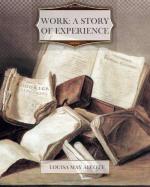Never had sweeter tears fallen than those that dropped upon the little tree as Christie took it in her arms, and all the rosy clusters leaned toward her as if eager to deliver tender messages. Surely her wish was granted now, for friendly hands had been at work for her. Warm against her heart lay words as precious as if uttered by a loving voice, and nowhere, on that happy night, stood a fairer Christmas tree than that which bloomed so beautifully from the heart of a Magdalen who loved much and was forgiven.
CHAPTER VII.
Through the mist.
The year that followed was the saddest Christie had ever known, for she suffered a sort of poverty which is more difficult to bear than actual want, since money cannot lighten it, and the rarest charity alone can minister to it. Her heart was empty and she could not fill it; her soul was hungry and she could not feed it; life was cold and dark and she could not warm and brighten it, for she knew not where to go.
She tried to help herself by all the means in her power, and when effort after effort failed she said: “I am not good enough yet to deserve happiness. I think too much of human love, too little of divine. When I have made God my friend perhaps He will let me find and keep one heart to make life happy with. How shall I know God? Who will tell me where to find Him, and help me to love and lean upon Him as I ought?”
In all sincerity she asked these questions, in all sincerity she began her search, and with pathetic patience waited for an answer. She read many books, some wise, some vague, some full of superstition, all unsatisfactory to one who wanted a living God. She went to many churches, studied many creeds, and watched their fruits as well as she could; but still remained unsatisfied. Some were cold and narrow, some seemed theatrical and superficial, some stern and terrible, none simple, sweet, and strong enough for humanity’s many needs. There was too much machinery, too many walls, laws, and penalties between the Father and His children. Too much fear, too little love; too many saints and intercessors; too little faith in the instincts of the soul which turns to God as flowers to the sun. Too much idle strife about names and creeds; too little knowledge of the natural religion which has no name but godliness, whose creed is boundless and benignant as the sunshine, whose faith is as the tender trust of little children in their mother’s love.
Nowhere did Christie find this all-sustaining power, this paternal friend, and comforter, and after months of patient searching she gave up her quest, saying, despondently:
“I’m afraid I never shall get religion, for all that’s offered me seems so poor, so narrow, or so hard that I cannot take it for my stay. A God of wrath I cannot love; a God that must be propitiated, adorned, and adored like an idol I cannot respect; and a God who can be blinded to men’s iniquities through the week by a little beating of the breast and bowing down on the seventh day, I cannot serve. I want a Father to whom I can go with all my sins and sorrows, all my hopes and joys, as freely and fearlessly as I used to go to my human father, sure of help and sympathy and love. Shall I ever find Him?”




